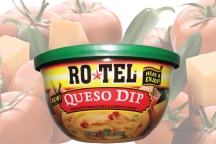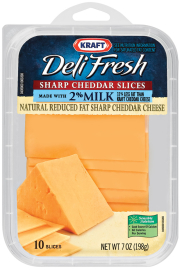Greenpeace draws up list of ‘bad’ seafood
China revises nutrition label guidelines
More environmentally-friendly products being manufactured
Grocery store chain announces beef program
ConAgra dip in microwaveable container
Kraft puts cheese slices in tray
China revises nutrition label guidelines
More environmentally-friendly products being manufactured
Grocery store chain announces beef program
ConAgra dip in microwaveable container
Kraft puts cheese slices in tray

by Pan Demetrakakes
Executive Editor
Seafood has drawn its fair share of food industry attention recently, with a controversy over retail standards, a recall and other news in the processing sector.
• Greenpeace is trying to survey grocers and influence them about what kinds of seafood to carry. The consumer/environmental organization is asking leading food retailers about their procurement policies and practices regarding seafood. Greenpeace is also pressing stores to stop selling 23 species of seafood, because they’re overfished or farm-raised in a way that damages the environment or small fishing communities.
The National Fisheries Institute has denounced the Greenpeace list of species as “without scientific merit,” and stated that it will “oversimplify complex fishery management issues.”
• Del Monte Foods is reportedly seeking “strategic alternatives,” including a possible sale, for its StarKist seafood business. Rising seafood prices have forced Del Monte to raise prices on several StarKist products. The company emphasized that it has not made a decision to sell the business.
• The Food and Drug Administration has shut down a processor of catfish steaks and other smoked seafood products for failure to develop a Hazard Analysis and Critical Control Points (HACCP) plan. Hope Food Supply, Pasadena, Texas, had entered into a consent decree with FDA to develop and implement a HACCP plan. The FDA said the company had not begun to implement such a plan as of last week, and it will remain shut down until it has aHACCP plan in place.
• Stew Leonard’s, a specialty fresh food store with locations in Connecticut and Yonkers, N.Y., has added Naked Salmon to complement its existing Naked Beef and Naked Chicken products. The salmon is raised on a farm in Scotland that, according to the company, “practices environmentally sound techniques and [feeds] a diet that emulates what is found in the wild.”
Top Developments
China revises nutrition label guidelinesChina’s new voluntary nutrition labeling guidelines for packaged foods will set restrictions on features such as font size and on-pack positioning. They will also encourage labels that show nutrient content, nutrient reference value percent and levels of energy, protein, fat, carbohydrates and sodium per 100 grams, per 100 milliliters or per serving. Though they are not required to, if more Chinese manufacturers start using nutrition information labeling, it may prevent future government-imposed regulations. Companies have until April 30, 2010 to comply with the guidelines.
More environmentally friendly products being manufactured
The number of new products claiming to be environmentally friendly has increased from five in 2002 to 328 products in 2007, according to Mintel Global New Products Database. This shows manufacturers responding to the environmental concerns of American consumers, who are driven by price, perceived value and convenience. Almost 200 million American consumers purchase green products, particularly when shopping for household paper products, food and energy efficient appliances.
Grocery store chain announces beef program
Pennsylvania grocery store chain Weis Markets announced its Pennsylvania Proud Choice Angus Beef Program. The program, which is the first of its kind in the nation to be offered by a supermarket chain, ensures customers that they are buying locally raised, high-quality beef that is marketed under the PA Preferred brand and Beef Quality Assurance program.

New Packages
ConAgra dip in microwaveable containerA new dip from ConAgra Foods comes in a plastic cup with shrink label. Ro*tel Queso Dip is packaged in a molded polypropylene cup and vinyl shrink label, both supplied byPrintpack. The 2-mil shrink label is printed in eight-color rotogravure, with a special adhesive applied during printing. The product is meant to be microwaved in the container.

Kraft Foods has put out a new version of cheese slices in more easily reclosable packaging. Kraft Deli Fresh slices are shingled cheese slices, interleaved with paper, inside a rigid tray that closes with a click to assure consumers of a complete seal. Deli Fresh slices come in five flavors, in 7- or 8-ounce packages with 10 to 14 slices per package, and will be available in June.
